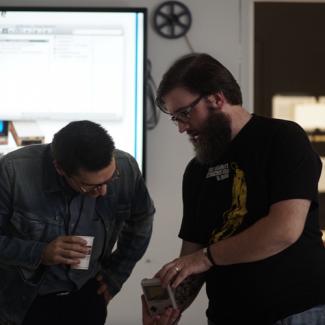New computer and video game systems are released at regular intervals, often before the full limits and possibilities of existing systems are reached. Communities of artists and musicians use these legacy systems to create new work. The goal of this workshop is to introduce students to the practice of using legacy video game systems to make music. We will listen to a small sampling of music from these communities, including some of my own, and then we will explore different creative software using emulators of Nintendo Game Boy and Commodore 64 hardware. The advantage of working with emulators is that they offer the opportunity to test ideas and experiment in these environments without having to invest in the vintage hardware first.
For this workshop, students will be required to bring a laptop computer and a pair of headphones. They should be comfortable installing software and working with new software. A background in music is helpful, but not required. I will provide emulators, software sequencers that run in these emulators, and example files that demonstrate how I build a composition using these tools. During the workshop we will explore both emulator environments and learn how to use the provided tools. Students will spend time working on their own pieces, with regular feedback and assistance. Each will leave the workshop with copies of all demonstrated software and the beginnings of their own pieces.
My own work with the Nintendo Game Boy began in 2006 through a collaboration with choreographer Boris Willis titled Abandoned Revolution—a dance work that incorporated video game story elements. I composed and performed a score that supported the dance and added emotional underpinnings to the story elements in his piece. My work since then has focused on the Gameboy as a performance and production tool. I have presented new work in concert halls, clubs, and on air, including an 8-channel surround sound piece that was premiered at Electronic Music Midwest and then presented at Stony Brook University and at Circuit Bridges in New York.
Often, the use of these gaming systems to make music is rooted in nostalgia. I try to explore beyond that impulse. Using a legacy system in the context of current and emerging media and practices embraces the limitations of the earlier technology in the pursuit of self-expression. Within these limitations—such as the Nintendo Game Boy’s severely limited sound crafting capabilities—I find the landscape of possibilities inspiring and fertile, and capable of expressiveness. My goal in this workshop is to provide students with both the tools to explore and an appreciation for the aesthetic of legacy gaming systems.
Requirements
Each attendee will need to bring a laptop computer with the necessary emulators installed (a list will be provided in advance).
The hosting facilities will need to provide speakers for playback of music, a projector and screen, and enough table space for all participants.
I will provide all necessary ROM files, which will be distributed to all workshop participants.
Work Samples and more
Vintage Machines Project

